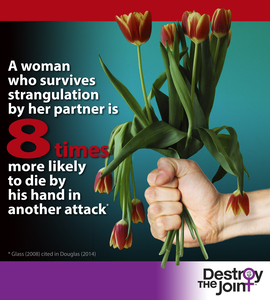10 signatures reached
To: Hon Natasha Fyles Attorney-General and Minister for Justice Minister for Health
Strengthen Northern Territory laws against non-fatal strangulation

Please support our calls to review and amend laws covering non-fatal strangulation, as well as training for legal, medical, advocacy and other professionals to enhance their knowledge of strangulation and to improve policy and practice.
At present the Northern Territory has strangulation laws which only apply if the victim is strangled with the intent of committing another indictable offence or fleeing. For example, to subdue a victim so that she could be raped or to make it easier for the perpetrator to leave the scene of the crime. This charge couldn't be used for summary offences, like using strangulation to instil fear in a victim to further a breach of a domestic violence order.
We urge you to:
1. support a criminal charge of strangulation, similar to those in Queensland and the ACT, to address non-fatal strangulation;
2. ensure that laws recognise that:
a) strangulation can cause long-term disability and death, even if the victim remains conscious;
b) the intent of a domestic violence perpetrator may be to instil fear and control the victim, rather than to inflict injury on or kill them.
3. support training to enhance professionals’ knowledge of strangulation and to improve policy and practice.
At present the Northern Territory has strangulation laws which only apply if the victim is strangled with the intent of committing another indictable offence or fleeing. For example, to subdue a victim so that she could be raped or to make it easier for the perpetrator to leave the scene of the crime. This charge couldn't be used for summary offences, like using strangulation to instil fear in a victim to further a breach of a domestic violence order.
We urge you to:
1. support a criminal charge of strangulation, similar to those in Queensland and the ACT, to address non-fatal strangulation;
2. ensure that laws recognise that:
a) strangulation can cause long-term disability and death, even if the victim remains conscious;
b) the intent of a domestic violence perpetrator may be to instil fear and control the victim, rather than to inflict injury on or kill them.
3. support training to enhance professionals’ knowledge of strangulation and to improve policy and practice.
Why is this important?
CONTENT WARNING
A woman surviving non-fatal strangulation is eight times more likely to be later murdered by her domestic violence perpetrator.
Like Victorian woman, Joy Rowley who was choked unconscious eight months before her murder. Her assailant “wasn't charged for six months amid police concern there was insufficient evidence". https://goo.gl/xHSG8k
Survivors of strangulation are also at risk of disability or later death, with no external signs of injury, and which may be incorrectly attributed to other causes because of the delay between the assault and the appearance of symptoms. See: https://goo.gl/XEQFe9
It’s a weapon to instil fear and increase control over a victim.
Professionals may miss subtle signs. Training can improve practice and policy.
Victims' participation in life is affected, as are families' and communities. Child witnesses suffer disrupted education and their health may be affected.
Laws which don't recognise the impact of non-fatal strangulation, or have limited applications, have been shown to let perpetrators get away with their crimes and leave victims living with violence under threat of death.
A woman surviving non-fatal strangulation is eight times more likely to be later murdered by her domestic violence perpetrator.
Like Victorian woman, Joy Rowley who was choked unconscious eight months before her murder. Her assailant “wasn't charged for six months amid police concern there was insufficient evidence". https://goo.gl/xHSG8k
Survivors of strangulation are also at risk of disability or later death, with no external signs of injury, and which may be incorrectly attributed to other causes because of the delay between the assault and the appearance of symptoms. See: https://goo.gl/XEQFe9
It’s a weapon to instil fear and increase control over a victim.
Professionals may miss subtle signs. Training can improve practice and policy.
Victims' participation in life is affected, as are families' and communities. Child witnesses suffer disrupted education and their health may be affected.
Laws which don't recognise the impact of non-fatal strangulation, or have limited applications, have been shown to let perpetrators get away with their crimes and leave victims living with violence under threat of death.
